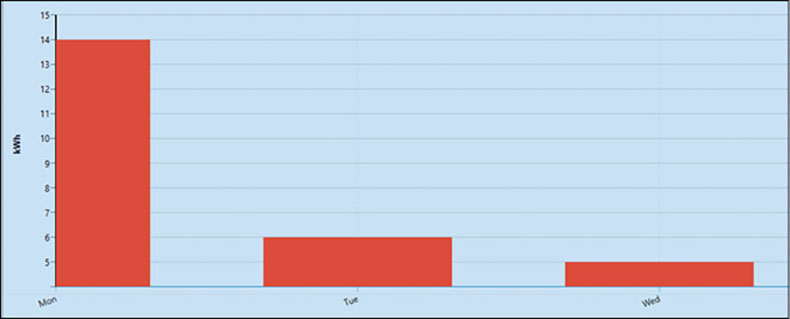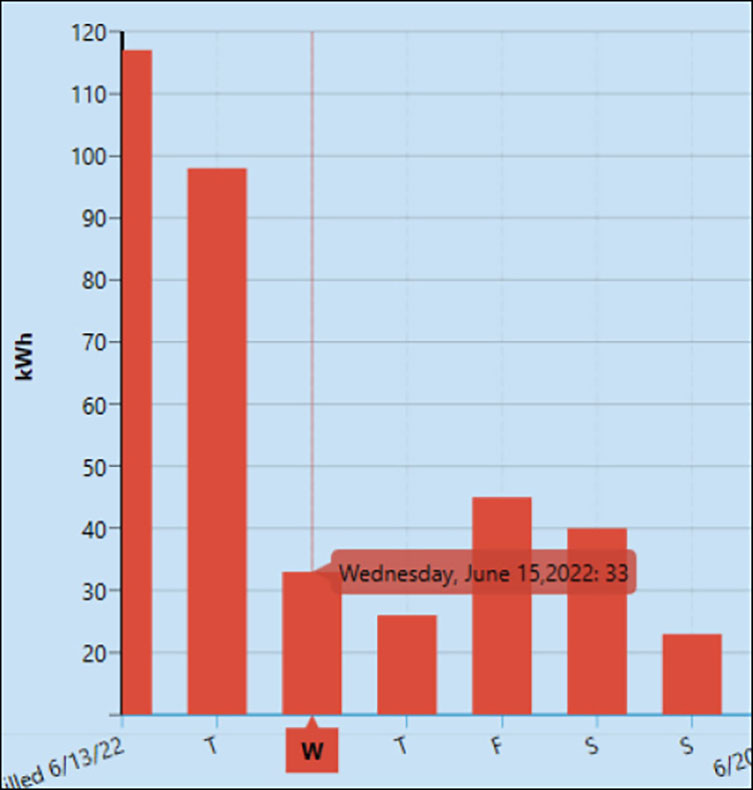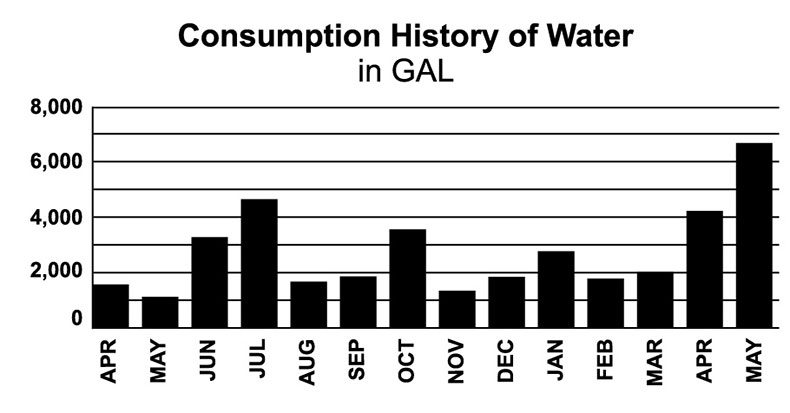In the span of five weeks, Tideland energy auditors discovered two very different incidents of hot water problems. In both cases, interval meter readings, which are available to all residential members via the member portal, were quickly able to confirm the issue.
It’s Getting Hot In Here
In the first incident, the member was not a full-time resident and only occasionally used the Tideland served property. In December 2022, the member used 193 kilowatt hours (kWh). The next month it jumped to 1,888 kWh followed by 1,552 in February and 1,521 in March. Our energy auditor arrived to investigate on April 26.
The property caretaker reported that the HVAC system was always kept at either the highest- or lowest-possible setting depending on the operating mode. At the time of the audit, the system was in the cooling mode and the thermostat was set at 99°F. The home’s ductwork appeared to be in great shape, and with the exception of a nearly empty refrigerator and a utility room freezer, there didn’t appear to be anything else running.
However, the auditor did note that the water heater breaker was in the “On” position. That seemed odd given that the home is unoccupied for such long periods of time. The caretaker reached the property owner by phone so we could confirm the monthly water bill. There had been no increase in water consumption and no leak was detected during the audit. The auditor was unable to remove the access panel to allow for a visual inspection of the water heater. So the only way to verify the temperature was to turn on a hot water faucet. The auditor turned on the faucet closest to the water heater and it immediately streamed out scalding hot water. That fairly well confirmed the problem. The energy auditor turned off the water heater breaker, noted the time, and told the caretaker she would monitor the interval meter reading data to see what impact that had on the home’s energy use.
As the daily meter reading chart shows, the drop in energy consumption was immediate and substantial. In all honesty, it’s amazing and a blessing that the water heater pressure relief valve didn’t open up. It was likely just a matter of time.
Looking back at the daily meter readings, it appears the water heater malfunctioned around January 5 and was contributing about $125 a month in additional energy costs.
Following the visit and confirmation of the water heating problem, the co-op created a high energy use alert for the member to nip any future problems in the bud. The member decided to replace the water heater since it was original to the home. Normally a repair would suffice. The member will also keep the water heater breaker shut off when the residence is unoccupied.
The following month the energy use dropped down to 486 kWh, and even when the member visited, it never went above 600 kWh.
Don’t Go Chasing Waterfalls
The second discovery took place in late June. First, kudos to member service representative Myra Carter in our Grantsboro office for referring this member to the energy audit team. While she could see that the member’s energy use was trending with the outdoor temperatures and recommended setting the heat pump thermostat a little higher, Myra also knew that the jump in the member’s bill couldn’t be justified given no changes in the household’s makeup or consumer behaviors.
The energy auditor reached out to the member by phone and obtained the following information:
- Indoor temperature setting during air conditioning season: 72°F
- 80-gallon water heater
- One occupant
- Year-round residence
The member’s energy use for April, May and June 2021 averaged 713 kWh per month. For the same three-month period in 2022 the average monthly consumption was 1,611 kWh. In fact, June 2021’s energy use was just 772 kWh while June 2022 was 2,357 kWh. That’s a 205% increase! Immediately the energy auditor knew something was seriously wrong.
That evening, June 14, the energy auditor asked the member to turn off the water heater at the breaker for a 24-hour period as a process of elimination. The auditor told the member, “With an 80-gallon tank and just one occupant you will still have plenty of hot water.” They arranged to speak the following evening after the hourly meter readings were uploaded.
When the energy auditor looked at the hourly meter reading data, she was convinced the member had misunderstood the instructions and had cut off both the water heater and the HVAC system. Why? Because the daily energy consumption had dropped from 117 kWh to just 33 kWh.
During a subsequent phone call the member said the HVAC was still on but the thermostat had been raised 2 degrees. It was the next statement that made our energy auditor nearly drop the phone. The member said, “I didn’t do laundry. I didn’t run the dishwasher. But I did have to take an ice cold shower.”
What? 80 gallons of hot water gone without any household use? Holy smokes. We have a major leak!
The auditor arrived at the member’s home the following morning and the first course of business was to look at the member’s water bill. It confirmed the presence of a leak. Compared to the same time period for the previous year, water use had increased nearly 7,000 gallons.
The next item of business was to identify the leak. The water heater itself was easily checked off the list. Inside the house they checked the kitchen, laundry room, guest bath and then the primary bath. The toilet and sink were eliminated, but then the auditor heard something. She stepped into what is a fairly new curbless shower and put her ear against the wall tile. That’s when the auditor heard what sounded like a waterfall.
While the homeowner initially thought the sound was coming from the bathroom air-conditioning vent, when they walked into the bedroom and listened to the shower wall again it became obvious where the leak would be found. An inspection of the crawlspace showed significant signs of moisture due to stringy insulation, but given the location of the access door, ponding water was not readily apparent. The following day, a contractor identified a plumbing defect associated with the shower remodeling that has since been repaired. The 80-gallon water heater, which was 30 years old, was proactively replaced with a new 40-gallon model. Since repairs were completed the member’s energy use now averages 29 kWh per day.
The final spin
It bears repeating: every Tideland member needs to set up a high energy use alert. Also use the power of the portal’s interval meter reading data to do your own testing, including water heaters, pool pumps and HVAC systems. Remember, knowledge is power. In some cases it could save you a great deal of power and money.
Need help?
Tideland's trained energy consultants will be glad to help you evaluate your home's energy use.





